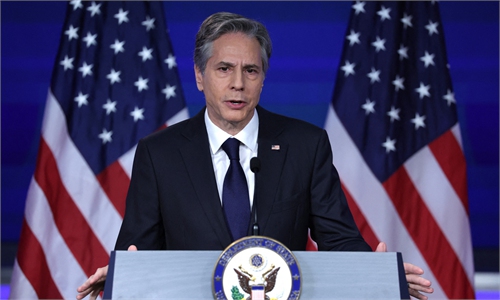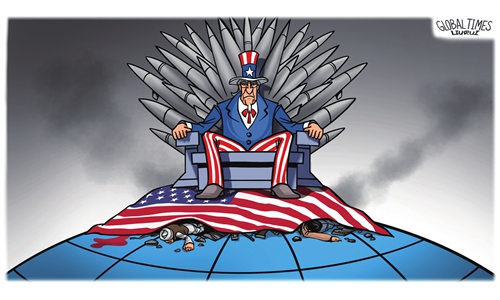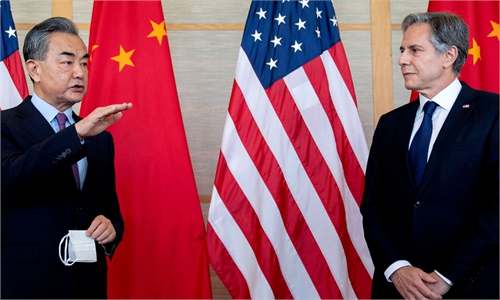China-US five-hour meeting in Bali thoroughly communicated; 'frequent dialogues help solve prominent issues'
‘Frequent dialogues to solve prominent issues, but tension would be prolonged’
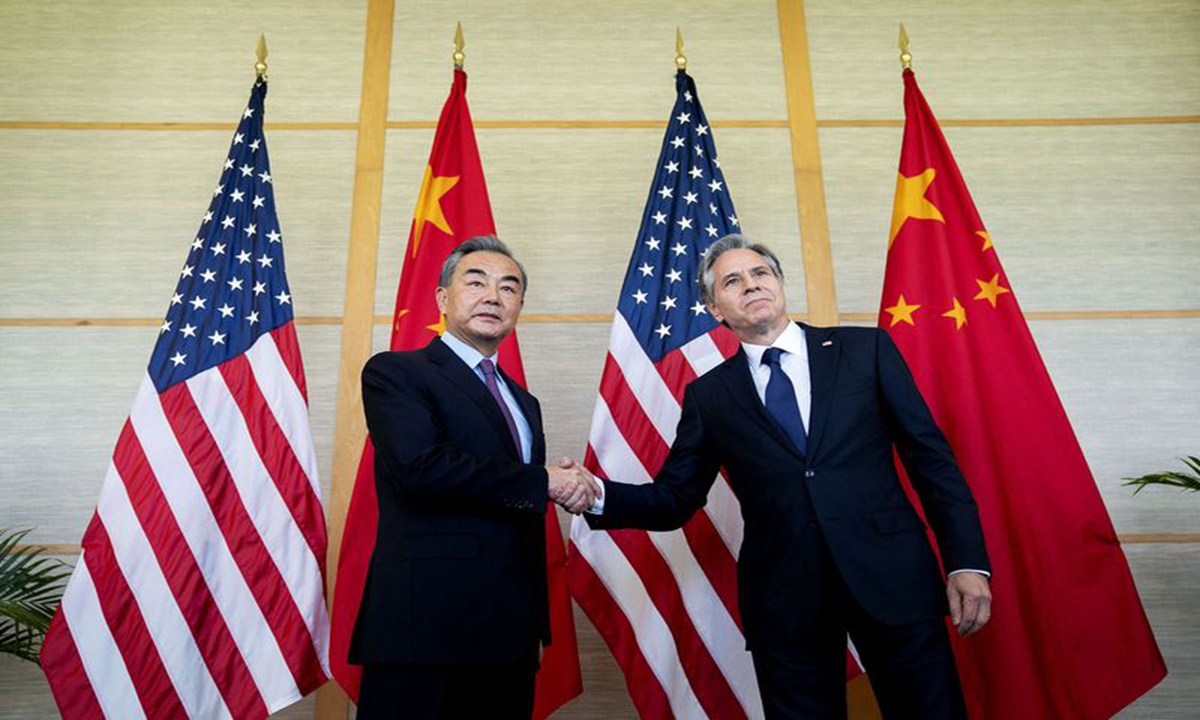
Chinese State Councilor and Foreign Minister Wang Yi with US Secretary of State Antony Blinken in Bali on July 9. Source: AFP
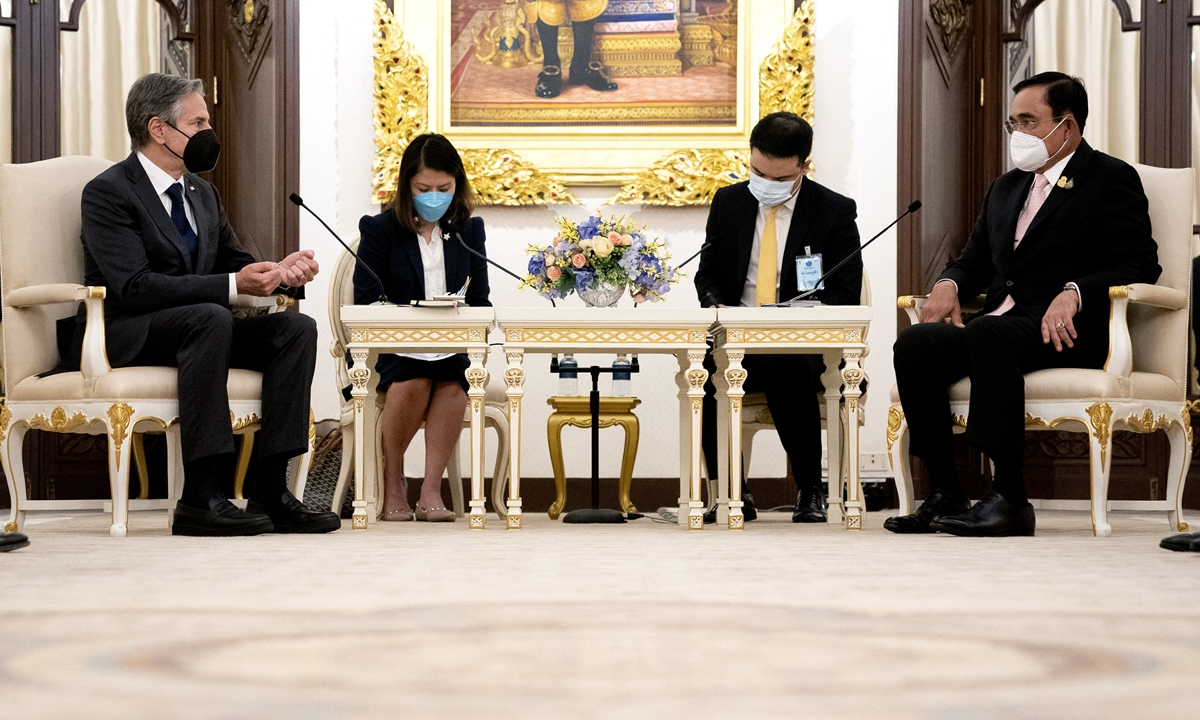
US Secretary of State Antony Blinken (left) meets with Thailand's Prime Minister Prayut Chan-ocha (right) at Government House in Bangkok on July 10, 2022. Photo: AFP
Chinese State Councilor and Foreign Minister Wang Yi held a "comprehensive, in-depth, candid and efficient conversation" with US Secretary of State Antony Blinken, to which the two sides attached great importance, after attending the G20 Foreign Ministers' Meeting in Bali on Saturday, the Global Times has learned on Sunday.The meeting in Bali lasted more than five hours, which is a long time for a one-on-one meeting and has been rare in ministerial level talks in recent years, the Global Times learned from the meeting.
Simultaneous interpretation was adopted throughout the meeting, it also learned. That means the two sides were able to have thorough communication on a wide range of issues in China-US relations, conducive to delivering clear messages from both sides.
Both China and the US believe that the Saturday dialogue in Bali was substantive and constructive, and will help to enhance mutual understanding, reduce misunderstanding and miscalculation, and pave the way for future high-level exchanges between the two countries, according to the Xinhua News Agency.
The Chinese side described the meeting as "substantive" and "constructive" in the press release, which means that the two sides had a pragmatic discussion and covered comprehensive bilateral relations and specific issues in bilateral relations, an analyst told the Global Times.
The meeting was "constructive" in that some consensus was reached and some specific and outstanding issues were resolved, as can be seen from the press release, the analyst said, adding that the US has also made some positive statements, but it is more important for the US to implement what it has pledged in talks and China will observe if the US actions match its words.
Diao Daming, an associate professor at Renmin University of China, said: "I believe Blinken was trying to deliver a message that the US would like this meeting to achieve positive progress and ease the bilateral relations. This shows that the US' willingness for communication with China is increasing."
This is because of the inflation pressure and the problematic economic situation, experts said. According to US media, President Joe Biden could lift tariffs on just $10 billion worth of Chinese goods under a plan being discussed within the administration, while opening a new exclusion process for firms to win additional relief. That would cover only a small fraction of the duties that his predecessor imposed on approximately $370 billion worth of imports from China.
"The Biden administration's acts to seek frequent dialogues with senior Chinese officials and mentioning cooperation serve the purpose of solving imminent and prominent problems for the US, not the long-term positive development of China-US ties," Yuan Zheng, a deputy director and senior fellow of the Institute of American Studies, Chinese Academy of Social Sciences (CASS), told the Global Times on Sunday.
Easing inflation pressure is a key reason for the US to seek dialogue with China, but in other fields including safeguarding regional stability, reducing global economic recession, cracking down on transnational crimes and climate change, both sides share great space for cooperation, but this entirely depends on the attitude of the US and whether it shows sincerity with concrete actions, or it just wants competition and confrontation.
During the Saturday meeting, Wang told Blinken that as the US had promised not to support "Taiwan independence" separatism, it should stop hollowing out the one-China policy or playing the "Taiwan card" to sabotage China's reunification.
Wang Yi said the US has cited a need for "guardrails" for China-US relations, but the three joint communiqués are in fact the most reliable "guardrails" for the two countries and as long as the two countries fulfill their promises in the three communiqués, the bilateral relationship will not deviate from the right track. Otherwise, no amount of "guardrails" will work, Wang said.
Compared with the readouts released after previous meetings between senior officials, including recent dialogue between US national security advisor Jake Sullivan and China's top diplomat Yang Jiechi, Wang's remarks and warning to the US were notably more detailed and were "the sternest one in wording," Lü Xiang, a research fellow at the Chinese Academy of Social Sciences in Beijing, told the Global Times.
However, given China's characterization of the meeting as "constructive," the US may have also provided some positive indications during the talks, the expert noted.
On Sunday, US Secretary of State Antony Blinken continued his trip in Asia. The Biden administration moved Sunday to strengthen its ties with key Southeast Asian ally Thailand as it pressed ahead with efforts to "counter China's relentless push for influence in the region," the AP reported.
Blinken did not mention China by name in his comments with Thai Prime Minister Prayuth Chan-ocha or Foreign Minister Don Pramudwinai but after signing the deals said the US and Thailand "share the same goal of a free, open, interconnected prosperous, resilient and secure Indo-Pacific," according to the report.
Chinese analysts said China has never expected the US to totally change its containment policy in the short term, and China is fully prepared for prolonged tension with the US. The US is trying to maximize its competition with China but cannot afford the consequences of all-out confrontation or direct conflict, as it will damage its hegemony, so it wants to set so-called "guardrails." Such a mindset is likely to result in more competition than cooperation for bilateral ties, said experts.
Lü Xiang, an expert on US studies and research fellow at CASS, told the Global Times that the US decision-makers cannot even make a decision on an issue like canceling punitive tariffs even when it is obvious it could help the US economy. This proves that the political struggles and divergences still prevail in the decision-making board of the Biden administration, as professional officials with a pragmatic mindset cannot be more influential than those who prioritize ideological and political struggles with China.
The US economy is now heading into the crisis, and it is up to Washington to decide which way, confronting China for political agenda or cooperating with China for pragmatic needs, could best decrease the damage for the US in the end. China will be realistic in handling future ties despite it has goodwill to maximize the fields for cooperation, analysts said.

